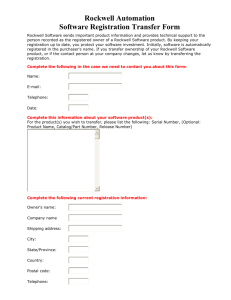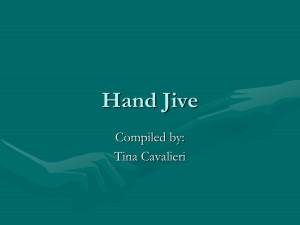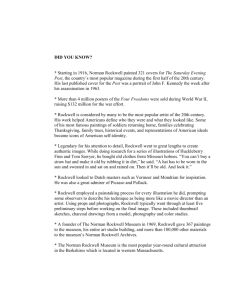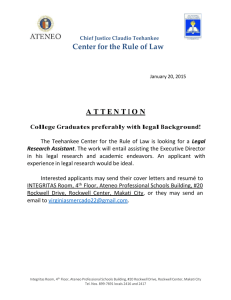WA_Law_PP_Ch09
advertisement
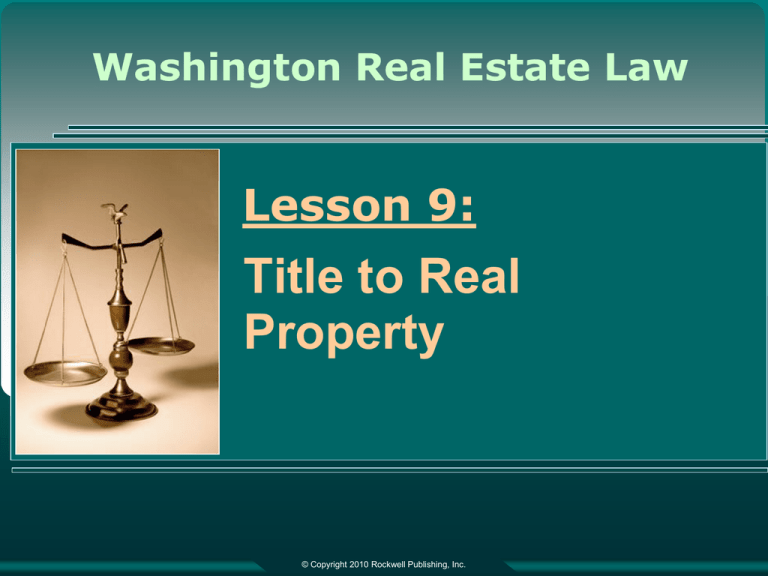
Washington Real Estate Law Lesson 9: Title to Real Property © Copyright 2010 Rockwell Publishing, Inc. Introduction In this lesson: voluntary alienation (deeds and wills), involuntary alienation (intestate succession, escheat, court decisions, adverse possession, condemnation, dedication, natural changes), recording, and title insurance. © Copyright 2010 Rockwell Publishing, Inc. Alienation Alienation: The process of transferring ownership of real property from one person to another. Alienation may be voluntary or involuntary. © Copyright 2010 Rockwell Publishing, Inc. Voluntary Alienation Deeds Deed: A document used by an owner of real property to transfer all or part of her interest in a property to another. Grantor: Person transferring property. Grantee: Person receiving property. The most common method of voluntary alienation is by deed. © Copyright 2010 Rockwell Publishing, Inc. Deeds Requirements A valid deed must: be in writing, contain words of conveyance and description of property, identify grantee, be signed and acknowledged by competent grantor, and be delivered to and accepted by grantee. © Copyright 2010 Rockwell Publishing, Inc. Deeds Requirements The statute of frauds requires any transfer of an interest in real property to be in writing. A transfer of real property can’t be accomplished orally. © Copyright 2010 Rockwell Publishing, Inc. Deeds Requirements Words of conveyance: Language in a deed that actually conveys the property to the new owner. Also called the granting clause. The requirement for words of conveyance is easily met—usually one word, such as “convey,” is sufficient. © Copyright 2010 Rockwell Publishing, Inc. Deeds Requirements The property being conveyed must be adequately described in the deed. A legal description should always be included. © Copyright 2010 Rockwell Publishing, Inc. Deeds Requirements For deed to transfer title, it must name an existing and identifiable grantee. Grantee can be minor or mentally incompetent. Grantee may be corporation or other legal entity. © Copyright 2010 Rockwell Publishing, Inc. Deeds Requirements A valid deed requires a competent grantor (of legal age and sound mind). Every deed must name the grantor. © Copyright 2010 Rockwell Publishing, Inc. Deeds Requirements Grantor must sign deed (grantee’s signature is not required). Representative of grantor may sign instead, but grantor must authorize this via document called a power of attorney. © Copyright 2010 Rockwell Publishing, Inc. Deeds Requirements A power of attorney is automatically revoked if the principal dies. It’s also automatically revoked if principal becomes mentally incompetent. Exception: A durable power of attorney (one that states it will remain effective despite principal’s incompetence). © Copyright 2010 Rockwell Publishing, Inc. Deeds Requirements Acknowledgment: A declaration by the grantor that he has signed a deed or other document voluntarily. Acknowledgment usually occurs when grantor signs in front of notary public. Someone with interest in property can’t act as notary. © Copyright 2010 Rockwell Publishing, Inc. Deeds Requirements In Washington, deed can be valid even though it wasn’t acknowledged by grantor. Unacknowledged deed can’t be recorded (recording provides constructive notice of the transfer to third parties). © Copyright 2010 Rockwell Publishing, Inc. Deeds Delivery, donative intent, acceptance Even if deed contains all required elements, it will not transfer title until: it is delivered by grantor, with intent to pass title, and grantee accepts it. Physical delivery of deed is usually necessary. © Copyright 2010 Rockwell Publishing, Inc. Deeds Delivery, donative intent, acceptance Delivery must take place during grantor’s lifetime. Deed can’t be delivered to grantee after grantor’s death. © Copyright 2010 Rockwell Publishing, Inc. Deeds Delivery, donative intent, acceptance Grantee may refuse to accept a deed. This may happen because of personal or financial reasons. © Copyright 2010 Rockwell Publishing, Inc. Deeds Other elements Deeds often include optional elements, such as: date of deed, grantee’s signature, and recital of consideration given for property. While optional, recital of consideration may help show that transaction was purchase and not gift (gift deed may be vulnerable to claims by grantor’s creditors). © Copyright 2010 Rockwell Publishing, Inc. Voluntary Alienation Types of deeds Three main types of deeds in Washington: general warranty deed, bargain and sale deed, and quitclaim deed. © Copyright 2010 Rockwell Publishing, Inc. Types of Deeds General warranty deed The general warranty deed contains these guarantees: grantor has good title to property conveyed, grantor has right to convey property, property is free from undisclosed encumbrances, grantor promises quiet and peaceable possession, and grantor will defend title against anyone with possible lawful claim to it. © Copyright 2010 Rockwell Publishing, Inc. Types of Deeds General warranty deed General warranty deed is most comprehensive and most commonly used deed in Washington. It gives the grantee the most protection. © Copyright 2010 Rockwell Publishing, Inc. Types of Deeds Bargain and sale deed Bargain and sale deed contains these guarantees: nothing grantor has done has encumbered the property, and grantee’s possession of property won’t be disturbed by claims of ownership brought by grantor’s heirs or assigns. © Copyright 2010 Rockwell Publishing, Inc. Types of Deeds Bargain and sale deed With bargain and sale deed, grantor only guarantees her own actions. Essentially, grantor conveys the same interest in the property that she acquired from previous owner. © Copyright 2010 Rockwell Publishing, Inc. Types of Deeds Quitclaim deed A quitclaim deed is often used to cure clouds on title. Clouds could be technical flaws in an earlier conveyance, such as misspelling party’s name. © Copyright 2010 Rockwell Publishing, Inc. Types of Deeds Quitclaim deed In a quitclaim deed, grantor simply conveys whatever interest he has. Quitclaim deed contains no warranties. Quitclaim deed will convey nothing at all if grantor has no interest in property when deed is signed. © Copyright 2010 Rockwell Publishing, Inc. Types of Deeds Quitclaim deed Quitclaim deed used when grantor wants to avoid making any warranties. Grantor might want to avoid warranties when making a gift, or when unsure of her title. © Copyright 2010 Rockwell Publishing, Inc. Types of Deeds After-acquired title After-acquired title: The acquiring of good title after having made a transfer to a grantee of something less than good title. In this situation, good title automatically passes to grantee (provided transfer was by a general warranty deed or a bargain and sale deed). © Copyright 2010 Rockwell Publishing, Inc. Types of Deeds After-acquired title After-acquired title normally does not pass to grantee under quitclaim deed. Quitclaim deed transfers only grantor’s current interest. © Copyright 2010 Rockwell Publishing, Inc. Voluntary Alienation Wills Will terminology: Testator: The person making out a will. Bequest: A gift of personal property in a will. Devise: A gift of real property in a will. Codicil: An amendment to a will. Executor: Person named in a will to carry out the will’s directions. Probate: Court process by which will is validated and the execution of its directions is supervised. © Copyright 2010 Rockwell Publishing, Inc. Wills Requirements In Washington, any person of sound mind who is at least l8 years old may make a will. To be valid, a will generally must be: in writing, signed by competent testator, and attested to by two or more competent witnesses. © Copyright 2010 Rockwell Publishing, Inc. Wills Writing requirement Exception to written will requirement: Under limited circumstances, Washington will recognize a nuncupative (oral) will used to dispose of personal property. Real estate can never be devised by a nuncupative will. © Copyright 2010 Rockwell Publishing, Inc. Wills Signature requirement Generally, will must be signed by testator. Someone else may sign for testator, at the request of testator, and in testator’s presence. © Copyright 2010 Rockwell Publishing, Inc. Wills Competency requirement Testator must have capacity: sufficient mind and memory to understand the transaction, comprehend the nature and extent of her property, and recollect the “objects of her bounty.” To invalidate will, evidence of incompetency must be clear, cogent, and convincing. © Copyright 2010 Rockwell Publishing, Inc. Wills Witness requirement Washington requires two or more competent witnesses to sign their names to the will in the presence of the testator. To validate will, witnesses must be able to testify that testator signed will or acknowledged his signature in their presence. © Copyright 2010 Rockwell Publishing, Inc. Wills Witness requirement Any competent adult may act as a witness. A beneficiary under the will should not act as a witness—doing so generally renders any provisions that give him property void. © Copyright 2010 Rockwell Publishing, Inc. Wills Revocation Will may be revoked by a later will, or by being intentionally destroyed. If will is accidentally lost or destroyed, but the court has sufficient evidence of will’s contents, it can proceed with probate. © Copyright 2010 Rockwell Publishing, Inc. Wills Community property In Washington, when a married person or registered domestic partner dies, one-half of any community property goes to surviving spouse/partner. The other one-half of the community property, and any of deceased’s separate property, may be disposed of by will. © Copyright 2010 Rockwell Publishing, Inc. Summary Voluntary Alienation Alienation Cloud on title Deed After-acquired title Grantor/grantee Will Power of attorney Testator Acknowledgment Codicil General warranty deed Executor Bargain and sale deed Probate Quitclaim deed Testamentary capacity © Copyright 2010 Rockwell Publishing, Inc. Involuntary Alienation Involuntary alienation: Any transfer of ownership or interest in property that occurs without action by the owner or against the owner’s wishes. © Copyright 2010 Rockwell Publishing, Inc. Involuntary Alienation Situations where involuntary alienation occurs: someone dies without a will, adverse possession, court decision, government action, or geological changes to the land. © Copyright 2010 Rockwell Publishing, Inc. Involuntary Alienation Intestacy Intestacy: Dying without leaving a valid will. Heirs: Family members listed by intestacy statute to receive the property of one who died intestate. Administrator: Person appointed by probate court to carry out distribution of intestate’s property. © Copyright 2010 Rockwell Publishing, Inc. Involuntary Alienation Escheat Escheat: The process by which the state takes title to property of a person who dies intestate and without any heirs. © Copyright 2010 Rockwell Publishing, Inc. Involuntary Alienation Escheat Escheat rarely occurs because number of potential heirs under intestacy statute is large. Heirs (in order of preference): children, then their descendents, parents, then their descendents, and grandparents, then their descendents. © Copyright 2010 Rockwell Publishing, Inc. Involuntary Alienation Court decisions The most common court actions that can result in involuntary alienation are: foreclosure, partition, and quiet title. © Copyright 2010 Rockwell Publishing, Inc. Court Decisions Foreclosure Foreclosure: When someone holding liens against a piece of real property forces the sale of the property because the liens aren’t paid off. © Copyright 2010 Rockwell Publishing, Inc. Court Decisions Foreclosure Foreclosure is available for any type of lien that attaches to real property, including: mortgages, construction liens, tax liens, and judgment liens. © Copyright 2010 Rockwell Publishing, Inc. Court Decisions Foreclosure In some foreclosure actions, the court will order the sheriff to auction the debtor’s property. Buyer receives a certificate of sale that ripens into title if debtor does not pay off debt within 8 months (or within 1 year in some cases). © Copyright 2010 Rockwell Publishing, Inc. Court Decisions Partition Suit for partition: A lawsuit to divide property when co-owners can’t agree how to divide it. Frequently the court will order property sold and proceeds divided among co-owners. © Copyright 2010 Rockwell Publishing, Inc. Court Decisions Quiet title Quiet title action: A lawsuit used to remove a cloud on the title or settle some other dispute regarding ownership. © Copyright 2010 Rockwell Publishing, Inc. Involuntary Alienation Adverse possession Adverse possession: A statutory process by which possession of someone else’s property can mature into title to that property. Purpose of adverse possession is to encourage productive use of property. © Copyright 2010 Rockwell Publishing, Inc. Adverse Possession Adverse possession can’t be claimed against government property (such as state-owned forests or city parks). © Copyright 2010 Rockwell Publishing, Inc. Adverse Possession Requirements In Washington, adverse possession requires possession of the land that is: actual, open and notorious, hostile, exclusive, and continuous and uninterrupted for specified period of time. © Copyright 2010 Rockwell Publishing, Inc. Adverse Possession Requirements Actual possession: Occupation and use of the property must be in a manner appropriate to the type of property. Living on the property isn’t necessary unless residence is an appropriate use. © Copyright 2010 Rockwell Publishing, Inc. Adverse Possession Requirements Many adverse possession claims involve narrow strips of land between adjoining properties. Planting and maintaining plants and hedges may meet requirements for actual possession. Just mowing lawn on a disputed strip is probably not enough to claim actual possession. © Copyright 2010 Rockwell Publishing, Inc. Adverse Possession Requirements Open and notorious: Manner of possession must be open enough to put a reasonable owner on notice that her ownership is threatened. Possessor can’t hide out on the land. © Copyright 2010 Rockwell Publishing, Inc. Adverse Possession Requirements Hostile: The adverse possessor must treat the property as his own as against all parties. If the owner has given the person permission to use property, use isn’t hostile. © Copyright 2010 Rockwell Publishing, Inc. Adverse Possession Requirements Exclusive: The adverse possessor cannot share possession with the true owner (knowingly or not). © Copyright 2010 Rockwell Publishing, Inc. Adverse Possession Requirements Continuous and uninterrupted: In Washington, an adverse possessor must possess the land for 10 successive years (7 years in some cases). Uninterrupted means without significant break. Continuous use only requires kind of use that true owner would make of property. © Copyright 2010 Rockwell Publishing, Inc. Adverse Possession Requirements The required period of continuous possession is only 7 years if possessor claims property: in good faith, under color of title, and pays taxes on it. © Copyright 2010 Rockwell Publishing, Inc. Adverse Possession Requirements Color of title: Someone who appears to have title, or believes she has title, even though her title is invalid, has color of title. The invalid title may be due to defect such as forged deed or erroneous land description. 7-year possession must be in good faith: possessor can’t know title is defective. © Copyright 2010 Rockwell Publishing, Inc. Involuntary Alienation Condemnation Condemnation: The exercise of the government’s power of eminent domain; a power to take private property for public use in return for fair market value. This power is granted by the Constitution. © Copyright 2010 Rockwell Publishing, Inc. Condemnation Any government entity can exercise power of eminent domain (state, city, school district, etc.). Limited use of power can also be delegated to private entities (though only for public benefit). Example: A private utility company authorized to condemn property for utility lines. © Copyright 2010 Rockwell Publishing, Inc. Involuntary Alienation Dedication Dedication: The transfer of privately owned land to the public without compensation. Sometimes dedication is voluntary, as when a philanthropist donates land for public park. © Copyright 2010 Rockwell Publishing, Inc. Involuntary Alienation Dedication Developers often have to dedicate land. If developer wants government approval for a subdivision, he may have to dedicate areas for public use (for streets, sidewalks, etc.). © Copyright 2010 Rockwell Publishing, Inc. Involuntary Alienation Natural changes Water action may change property boundaries. Accretion: The gradual enlargement of a property by water-borne soil deposits. Reliction: The gradual enlargement of a property by the retreat of a body of water. Avulsion: The sudden tearing away of land by flowing water or waves (however, the severed land still legally belongs to the original owner). © Copyright 2010 Rockwell Publishing, Inc. Summary Involuntary Alienation Intestate succession Adverse possession Escheat Color of title Foreclosure Condemnation Suit for partition Dedication Quiet title action © Copyright 2010 Rockwell Publishing, Inc. Recording The recording system protects purchasers by providing record of who holds interest in the land. The public record typically reveals the: present owner, legal description, liens against the property, and easements or restrictive covenants affecting the property. © Copyright 2010 Rockwell Publishing, Inc. Recording Procedures Various documents should be recorded, including: deeds, easements, covenants, certain long-term leases, mortgages and releases of mortgages, community property/separate property agreements, and powers of attorney to convey real estate. © Copyright 2010 Rockwell Publishing, Inc. Recording Procedures To record a document, deposit it with county recorder and pay a small fee. Recorder copies document and puts it in the public record. After recording, original document is returned to party named on the document as entitled to possession. © Copyright 2010 Rockwell Publishing, Inc. Recording Procedures Recorded documents can be searched for by: grantor name, grantee name, filing date, recording number, document type (deed, etc.), and legal description and other information. © Copyright 2010 Rockwell Publishing, Inc. Recording Notice The main purpose of recording deeds and other documents is to provide notice of the transaction to others. Every purchaser or mortgagee of land is charged with notice of all prior recorded documents concerning that property. © Copyright 2010 Rockwell Publishing, Inc. Recording Notice Constructive notice: Notice imparted by operation of law as a result of recording a document. A court won’t let a party claim ignorance of a recorded document. The document could easily have been discovered by checking public record. © Copyright 2010 Rockwell Publishing, Inc. Recording Notice Actual notice: Information (notice) acquired personally by a party. Actual notice may be gained from the seller, from other parties, or by inspecting the property. © Copyright 2010 Rockwell Publishing, Inc. Recording Washington law Washington’s recording statute has detailed format rules; documents that don’t meet these rules incur an additional fee and recording may be delayed. Among other things, a recordable document must: contain an abbreviated legal description, show county assessor’s tax parcel number, and have page margins of a certain size. © Copyright 2010 Rockwell Publishing, Inc. Recording Washington law Washington’s recording statute is a race-notice statute. This statute comes into play when there is an unrecorded sale or other transaction. The person who records first—provided he has no notice of the unrecorded conveyance—is considered true owner. © Copyright 2010 Rockwell Publishing, Inc. Recording Washington law Purchaser who knew about earlier conveyance cannot be true owner, even if she records first. She's not bona fide (good faith) purchaser. Because the recording statute is meant to protect purchasers, someone who inherits property or receives it as a gift may not be protected even if she records first. © Copyright 2010 Rockwell Publishing, Inc. Recording Torrens system Torrens system: Washington has also adopted the Torrens system of registration of land. The Torrens Act provides for the registration of title to land through a procedure that establishes a title free from all unregistered rights or claims. (This procedure is rarely used.) © Copyright 2010 Rockwell Publishing, Inc. Summary Recording Recording Actual notice Constructive notice Race-notice statute Bona fide purchaser © Copyright 2010 Rockwell Publishing, Inc. Title Insurance Title insurance: A contract in which a title insurance company agrees to indemnify (reimburse) the policy holder for losses caused by defects in the title. Title insurance is typically required when real property is purchased or mortgaged. © Copyright 2010 Rockwell Publishing, Inc. Title Insurance Obtaining coverage Before issuing a policy, the title insurance company: conducts title search, and then issues preliminary commitment for insurance, listing defects that will be excluded from coverage. Excluded defects typically include recorded liens and encumbrances. © Copyright 2010 Rockwell Publishing, Inc. Title Insurance Obtaining coverage If the party requesting insurance is satisfied with preliminary commitment, she will purchase the title insurance policy by paying the required premium. © Copyright 2010 Rockwell Publishing, Inc. Title Insurance Obtaining coverage Hidden defect: A title defect that can’t be discovered through a standard search of the public record. Title insurance policies usually cover hidden defects. © Copyright 2010 Rockwell Publishing, Inc. Title Insurance Obtaining coverage Some common types of hidden defects: forged signature on a deed, deed or mortgage release signed by a minor, deed or mortgage incorrectly stating marital status, or deed that was not properly delivered. © Copyright 2010 Rockwell Publishing, Inc. Title Insurance Types of coverage There are three basic types of title insurance policies in Washington: standard coverage policy, extended coverage policy, and homeowner’s coverage policy. © Copyright 2010 Rockwell Publishing, Inc. Title Insurance Types of coverage Standard coverage policy: Policy that insures an owner or lender against recorded defects in title, including hidden risks such as forgery. © Copyright 2010 Rockwell Publishing, Inc. Title Insurance Types of coverage Standard policy does not cover problems that would be revealed only by an accurate survey or inspection of the property. Matters that an inspection might reveal: adverse possession, unrecorded easement, or encroachment onto the property. © Copyright 2010 Rockwell Publishing, Inc. Title Insurance Types of coverage Extended coverage policy: Policy that insures against all matters covered by the standard coverage policy, plus matters that should be revealed by an inspection of the property. Buyer typically purchases extended coverage policy for the lender’s protection. This is called the mortgagee’s policy. © Copyright 2010 Rockwell Publishing, Inc. Title Insurance Types of coverage Homeowner’s coverage policy: Policy that covers most of the same title problems as an extended coverage policy, but also some additional items, such as violations of restrictive covenants. In Washington, residential purchase and sale agreements usually require seller to buy a homeowner’s policy for buyer. © Copyright 2010 Rockwell Publishing, Inc. Title Insurance Types of coverage Coverage of items not included in a title insurance policy might be obtained by buying an endorsement. Coverage is not generally available for protection from losses due to government action (condemnation, zoning change, etc.). © Copyright 2010 Rockwell Publishing, Inc. Title Insurance Abstract of title Abstract of title: An alternative to title insurance, no longer used in Washington, in which a property owner receives a condensed history of all recorded interests in the property (chain of title). An attorney examines abstract and renders an opinion on the condition of title. Does not provide protection against latent or undiscovered defects in the title. © Copyright 2010 Rockwell Publishing, Inc. Summary Title Title insurance Hidden defect Standard coverage policy Extended coverage policy Homeowner’s coverage policy Abstract of title © Copyright 2010 Rockwell Publishing, Inc.

